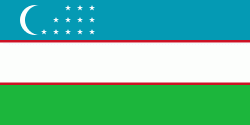Uzbekistan som
so'm or Ñўм
The sum (soʻm in Latin script, сўм in Cyrillic script, سوم in Arabic script; ISO code: UZS) is the official currency of Uzbekistan.The official name of the Soviet currency in Kazakh, Kyrgyz, Tajik, and Uzbek was som, and this name appeared written on the back of banknotes, among the texts for the value of the note in all 15 official languages of the USSR. The word sum (alternatively transliterated "som" or "soum") means "pure" in Kazakh, Kyrgyz, Uyghur and Uzbek, as well as in many other Turkic languages. The word implies "pure" silver or gold.
Country
-
Uzbekistan
Uzbekistan (, ; Ozbekiston / Ўзбекистон, ; Узбекистан), officially the Republic of Uzbekistan (Ozbekiston Respublikasi / Ўзбекистон Республикаси; Республика Узбекистан), is a doubly landlocked country located in Central Asia. It is surrounded by five landlocked countries: Kazakhstan to the north; Kyrgyzstan to the northeast; Tajikistan to the southeast; Afghanistan to the south; and Turkmenistan to the southwest. Its capital and largest city is Tashkent. Uzbekistan is part of the Turkic world, as well as a member of the Organization of Turkic States. The Uzbek language is the majority-spoken language in Uzbekistan, while Russian is widely spoken and understood throughout the country. Tajik is also spoken as a minority language, predominantly in Samarkand and Bukhara. Islam is the predominant religion in Uzbekistan, most Uzbeks being Sunni Muslims.
The first recorded settlers in what is now Uzbekistan were Eastern Iranian nomads, known as Scythians, who founded kingdoms in Khwarazm (8th–6th centuries BC), Bactria (8th–6th centuries BC), Sogdia (8th–6th centuries BC), Fergana (3rd century BC – sixth century AD), and Margiana (3rd century BC – sixth century AD). The area was incorporated into the Iranian Achaemenid Empire and, after a period of Macedonian rule, was ruled by the Iranian Parthian Empire and later by the Sasanian Empire, until the Muslim conquest of Persia in the seventh century.
